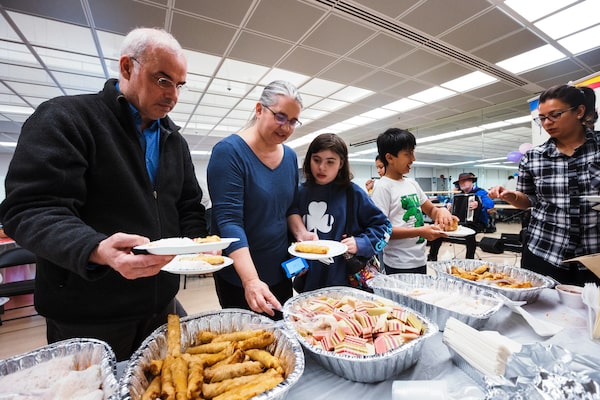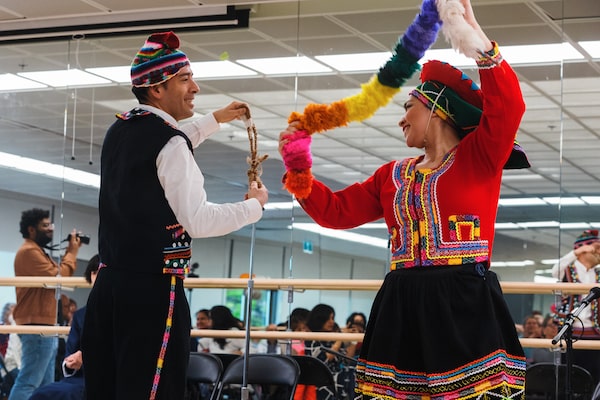
The Burnaby Festival of Learning is run each spring on an approximately $150,000 budget, split between Simon Fraser University and the city, with no corporate sponsorship.Sarah Race/Burnaby Festival of Learning
Joanne Curry, vice president, external relations at Burnaby, British Columbia’s Simon Fraser University (SFU), is always on the lookout for projects to strengthen the university’s relationship with the city, the third-largest in the province.
“Our university is on top of a mountain, and the question is always how to get off it,” Ms. Curry says. Burnaby’s diverse population of 250,000 wasn’t necessarily familiar with what was happening at the university either, something Ms. Curry had long wanted to change.
So, on a business trip in 2013, when Ms. Curry heard about the Cork, Ireland Learning Festival, her ears perked up. She was immediately smitten – the community-based event hosts a diversity of programs across topics from digital photography and local history to finding employment, all with the aim of celebrating learning. “This kind of festival says, ‘Learning is really fun, and let’s learn together,’” Ms. Curry says. She was convinced it could work in Burnaby.
Once home, Ms. Curry introduced the head librarian of SFU to the head librarian of Burnaby to see if they could co-organize something similar. Their brainchild was the 2016 Burnaby Festival of Learning.
Run each spring on an approximately $150,000 budget split between the school and the city, and with no corporate sponsorship – by choice – the involvement and engagement of both has proven key to the success of this eagerly anticipated, proudly grassroots event. This year the five-day Festival, held as usual in early May, attracted more than 2,000 people to more than 40 events held across the city – from dumpling-making and basket-weaving to nature meditation and climate solutions.
“Enthusiastic learning is contagious,” says festival director Tara Flynn. The programming, always planned with an eye to equity, diversity and inclusion, reflects the engagement of SFU, community members, and the British Columbia Institute of Technology (BCIT), which is also based in Burnaby and holds a commitment to lifelong learning.
Festival planning starts each September with a reflection on whose voices need to be heard during the event (there’s a special adviser on inclusion to ensure that those who may be underserved or under-represented are present). The planning then shifts to gathering ideas from an Advisory Committee and thirty community partners. Together, they bring forward what’s on the community’s mind and how to best represent the Festival’s vision and values – connecting, co-creating and celebrating – through the event’s annual theme, announced each November.
Burnaby offers two kinds of support for the Festival: a financial investment that pays for programming, marketing, and promotion costs, representing one-third of the total budget, and the use of the city-owned venues for the events. Denis Nokony, director of cultural services at the City of Burnaby, emphasizes the city’s commitment to happenings like the Festival of Learning, one of many they organize and offer entirely free of charge. “We don’t run these events to make money,” he says. “To turn a profit is not an issue.”

SFU’s financial contribution covers the team planning and managing of the festival, steered by its Office of Community Engagement.Sarah Race/Burnaby Festival of Learning
Burnaby’s Parks, Recreation and Culture Department, the umbrella department for Mr. Nokony’s division, has 12 per cent of the city’s total budget, operating an art gallery, museum, an art centre (including two theatres), an outdoor performance space and citywide services offering events and learning opportunities. Within the Culture budget, about $2-million, earned from city reserve funds, is spent on festivals and events. By Mr. Nokony’s estimation, these year-round happenings – including a blues festival, National Indigenous People’s Day and a classical music weekend – touch between 100,000 and 200,000 people annually.
SFU’s financial contribution covers the team planning and managing of the festival, steered by its Office of Community Engagement. Festival Director Flynn took over from the librarians four years ago. Actively involved in Burnaby’s civic organizations, including its Intercultural Planning Table and food security activities, Ms. Flynn works in concert with the Festival of Learning’s Advisory Committee, a 14-person group chaired by Burnaby librarian Heidi Schiller, providing continuity with the Festival’s roots.
A call for submissions for events is shared via the Festival’s newsletter and community groups. An adjudication committee evaluates the theme-based proposals as the Festival takes shape – with no volunteers. (Presenters are provided with a modest budget based on their proposal, including materials and staffing needs and bring their own team members to support their event, with Ms. Flynn running interference to support, photograph and otherwise lend a hand.
This year’s theme, Belonging, was expressed through four pillars: Food, Climate, Reconciliation and Home. Over 43 per cent of the events were organized by local NGOs, with SFU’s participation at 28 per cent and British Columbia Institute of Technology (BCIT), an increasingly active presenter based in Burnaby, providing 11 per cent of the programming. A mix of curated, local business and city programs filled out the remaining 18 per cent. The top four most popular events aligned with the theme pillars: a grocery tour to learn about Chinese ingredients run by dietitian Renée Chan, who includes food-related Chinese-language teaching in her session; an illustrated talk on Monarch butterfly migration in the Climate pillar; an Indigenous drum-making workshop as part of the Reconciliation pillar; and Rhythms, a session of music and dance from around the world underscored that the theme of Home encompasses people from many different places. Other sessions ranged from rangoli drawing to challah baking and making hygiene kits for the Burnaby’s unhoused community.
The city is all in, says Mr. Nokony, Burnaby’s director of cultural services.
“It’s about social sustainability and creating pride of place for us,” he notes. “We have the kind of city that says, ‘These things matter.’”